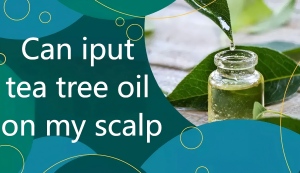Can iput tea tree oil on my scalp

Can You Use Tea Tree Oil on Your Scalp?
Yes, you can put tea tree oil on your scalp, but it needs to be done carefully to avoid irritation. Tea tree oil is a potent essential oil known for its antimicrobial and anti-inflammatory properties, which can benefit scalp issues like dandruff, itchiness, or even minor infections. However, it’s not something you should slather on straight from the bottle—dilution is key to keeping your scalp happy and healthy.
Why Use Tea Tree Oil on Your Scalp?
Tea tree oil is a go-to for many because it can tackle common scalp problems. Its antifungal and antibacterial qualities make it great for fighting dandruff caused by yeast-like fungi or soothing irritation from conditions like seborrheic dermatitis. Some folks also use it to help with scalp acne or to promote a cleaner, healthier scalp environment. If you’ve got an itchy scalp driving you up the wall, the cooling effect of tea tree oil can feel like instant relief.
How to Apply It Safely
Never apply undiluted tea tree oil directly to your scalp—it’s too strong and could cause burning or redness. Mix 5-10 drops of tea tree oil with a carrier like coconut oil, jojoba oil, or even your regular shampoo (about an ounce). Massage the blend gently into your scalp, let it sit for 5-10 minutes, then rinse thoroughly. You can do this a couple of times a week, but always do a patch test on your inner arm first to check for allergic reactions, especially if your scalp is sensitive.
Real-World Tips and Tricks
From what people share online, adding a few drops to your shampoo bottle is a popular hack for daily use—just shake it well before each wash. Others swear by DIY scalp masks with tea tree oil, aloe vera, and olive oil for a deep-conditioning treat. One user on a forum mentioned it helped clear up their flaky scalp after a few weeks, but they stressed rinsing it out well to avoid buildup. If you’re dealing with lice (yuck!), some studies suggest tea tree oil combined with lavender oil can help, but don’t rely on it alone—check with a doctor.
Things to Watch Out For
Tea tree oil isn’t for everyone. It can irritate sensitive skin or cause allergic reactions like rashes, so start small. If you’re pregnant, breastfeeding, or have pets (it’s toxic to cats and dogs), talk to a professional before using it. Overdoing it might dry out your scalp or hair, so stick to diluted amounts and don’t go overboard. If you notice increased redness or discomfort, stop using it and get medical advice.
Other Scalp-Friendly Alternatives
Not sold on tea tree oil? You’ve got options. Peppermint oil can soothe itchiness with a similar cooling vibe, while aloe vera gel is great for calming inflammation. For dandruff, shampoos with ingredients like salicylic acid or ketoconazole might pack a stronger punch. It’s all about finding what your scalp responds to best, so you might need to experiment a bit.
When to Seek Professional Help
If your scalp issues stick around despite using tea tree oil—say, severe flaking, open sores, or persistent itching—it’s time to see a dermatologist. These could signal something like psoriasis or a bacterial infection that needs more than a home remedy. Tea tree oil is a solid natural option for minor concerns, but it’s not a cure-all, especially for chronic conditions.
